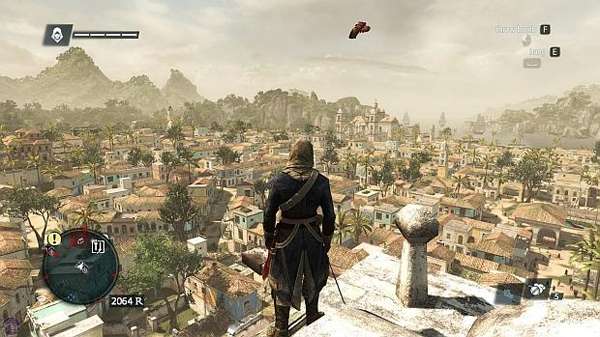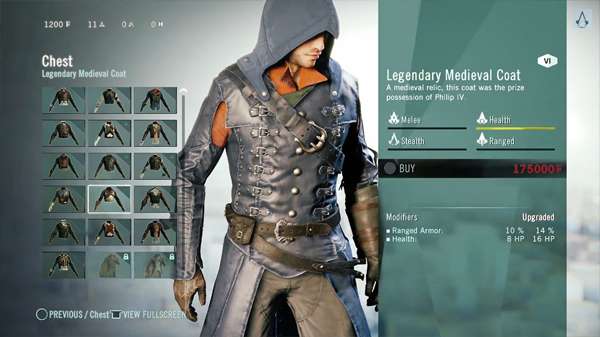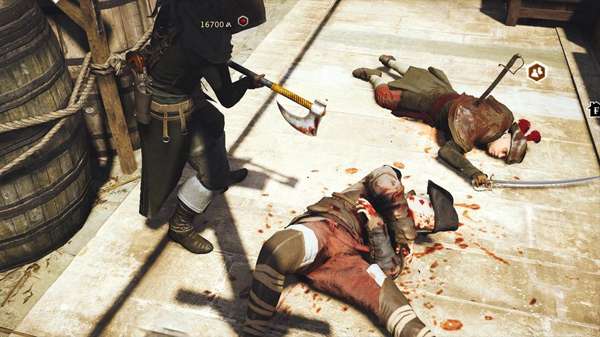
Assassin’s Creed Unity Xbox One Review
For gamers who aren’t interested in Sports or First Person Shooters, the Assassin’s Creed series has served as the most interesting annual videogame release, thanks to a combination of action and adventure framed with unique historical settings and tried-and-true gameplay mechanics. While Ubisoft’s long-running franchise hit a sour note with its third-numbered entry, the pirate-themed follow-up Black Flag went a long way to win back fans fearful of the series formula growing stale with each yearly addition.
Ubisoft, meanwhile, seems to have no fear whatsoever (or restraint, for that matter), as they have decided to give consumers a double dose of console assassination by releasing two games this year: Assassin’s Creed Rogue fills the gap other companies have left behind with the previous generation of consoles, while Assassin’s Creed Unity takes center stage as the debut title for Sony and Microsoft’s new generation of machines (Nintendo, meanwhile, is once again left in the cold). Naturally, all of the media attention is focused on the latter, as fans and critics alike join together to see what benefits the AC series can reap from a new engine running on more powerful consoles. What we got, instead, was the worst performing Assassin’s Creed game of all time…but at least it’s not the worst playing.

Following the conclusion of the Desmond storyline that began with the first game, Ubisoft took a more meta approach with their faux-time-travel premise with Assassin’s Creed Black Flag. Unity ditches both story concepts for something blander, as the story opens up with a faceless protagonist receiving instructions from a nameless hacker in order to help her prevent the Abstergo corporation from completing an unmentionable plot. The sterile storyline may prove disappointing to fans of either of the previous premises, but at least the historical portion is as involved as ever. This time around, the Animus takes players to Paris during the French Revolution, where the protagonist Arno is imprisoned for a murder he did not commit. In true Monte Cristo fashion, his cellmate is conveniently an Assassin who teaches Arno the ropes and helps him to escape captivity. Fueled by revenge, Arno pledges his life to the Assassin’s guild and vows to eliminate the Templars…even if one of the members happens to be his childhood sweetheart. The story does not tread new ground in the AC fiction, nor does it matches the very best in the series (AC2 and Brotherhood), but it is serviceable with many historical figures coming to play (including, unsurprisingly, Napoleon Bonaparte) as well as featuring some of the best facial animation seen yet this generation.
In fact, the visual tech in Assassin’s Creed Unity features the most changes to the series, with an extra emphasis in crowd density and lighting as well as the expected upgrades in textures and polygons with new consoles. From a visual standpoint, the series has never looked this good. From a technical standpoint, it has also never run this poorly. All of the visual fidelity and detail is completely marred by an uneven framerate, overly long load times and game-breaking glitches. The choppy framerate may have been expected considering the massive increase of NPCs crowding every corner of the street, but the dense population of NPCs is actually one of the things they got right; barring the occasional AI patron getting stuck somewhere that they shouldn’t, the crowds behave surprisingly well and are filled with an almost uncountable number of unique animations.

Strangely enough, it’s the less-populated portions of the game that feature the worst framerate. Scaling tall buildings will bring out some of the choppiest framerates, while navigating inside them somehow make things run worse. In truth, there is barely a moment where things aren’t hitching up, which drastically works against a game that requires absolute precision from players; whether by technical issues or poor programming, there have been more occasions than ever before where the controls result in players leaping in one direction when they meant to go another, which means lots of drunken movement and accidental leaps to your doom.
It really is unfortunate that Unity runs as poorly as it does, considering how well it plays; though featuring only a few notable revisions to the series’ formula, Assassin’s Creed Unity still features a robust addition of gameplay enhancements that creates a unique alternative experience that is also quite fun…when not ruined by the technical issues. Story missions are the standard trope of stealth missions, item hunts and enemy eavesdropping, but the outside story content is where the game really shines; returning to a unified city, Paris makes up the largest map ever seen in series history, which is absolutely crammed with side activities including the usual suspects (treasure chests, Animus artifacts, vantage points, etc) as well as the new “crowd activities”; every so often, a random crowd event will occur, such as criminals harassing innocent people, muggers stealing money pouches, assassination targets roaming the streets, etc. Taking part in these activities will yield rewards as well as experience points.
In a move inspired by RPGs, Unity now features levels that players unlock with experience points, in addition to new abilities that are unlocked by points following certain level thresholds. These perks include classic abilities such as the double takedown and the money pouch, but can also unlock permanent upgrades to health and item capacity. Players have the freedom to prioritize abilities as well as equipment, with shop vendors carrying the largest assortment of equippable weapons and gear yet, though it goes without saying that the more useful stuff is also the most expensive. Good thing you have Helix points as an alternative means of currency, said no one ever.

For people who despise microtransactions in their games, be forewarned; in what may be one of the biggest examples of a lack in foresight, Ubisoft has employed multiple forms of microtransactions in Assassin’s Creed Unity, turning much of the game into a walking billboard that desperately wants players to spend more money or waste more time in things beyond the base game. You have Uplay, which is honestly the least offensive additional service that also requires the least amount of work; you have Helix points, which are an alternative currency that is bought with real currency with the promise of offering temporary boosts (such as extra health and damage for a few minutes) as well as cheaper store items (assuming you interpret spending real money to be “cheaper”); there’s also the Assassin’s Creed Initiates app, a separate iOS game that unlocks exclusive chests in the world (often indistinguishable from normal chests until you identify them by their blue color). While none of these services are required to unlock any meaningful content in the game, the sheer number of them as well as the frequency in which the game reminds you of their existence while also combined with the poor performance of the game itself leads to one of the most disgustingly greedy experiences that should never have existed in this day and age, to say nothing of a series as high profile as this one.
All of this is truly unfortunate, as once more there is a good game to be found underneath it all. Yet it seems nearly every positive aspect has an annoyance to overcome. Enemy guards are much stronger and more tenacious as ever seen before, which leads to more thrilling battles but also more deaths as a result of a failed stealth segment (of which there will be many thanks to the flimsy cover system). Movement now includes a high and low profile button that allows players to scale up buildings quicker and/or scale down and under areas faster. This, once more, is hampered by the choppy framerate and controls. Online multiplayer has been replaced with online co-op, where groups of players can team up for simultaneous assassination. This mode works well enough, but many of the missions are not that different from singleplayer ones, and can often be completed with a solo player just fine. Other highlights include story-based simulation across different time periods with a focus on traversal rather than combat, as well as several brilliant (and bloody) combat animations that also include the ability to instantly kill enemies while sprinting.

As of this writing, Ubisoft has created a live blog that promises to address all of the technical issues that is plaguing their high profile game. Considering their misplaced priorities, however, they hardly deserve a pass for releasing Assassin’s Creed Unity in the miserable shape that it’s in, which damages both this decent entry in the series as well as the very AC brand itself.
